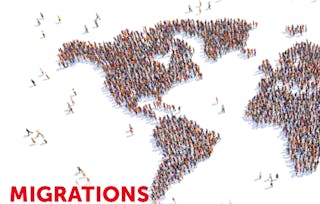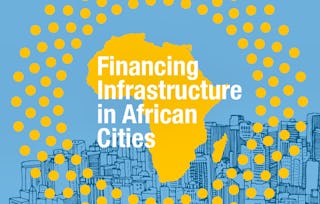Au-delà des relations internationales classiques, le processus de mondialisation mobilise quantité d'acteurs économiques, sociaux et culturels, individuels et collectifs, qui agissent dans l'espace mondial. Nous étudions ensemble, Africains, Latino-américains et Européens, comment il en dérive de nouvelles relations internationales. Ce cours prend sa source dans les approches sociologique et historique françaises des relations internationales, comme celles promues en Afrique et en Amérique latine.

Afrique et mondialisation, regards croisés

Afrique et mondialisation, regards croisés


Instructors: Bertrand Badie
11,866 already enrolled
Included with
243 reviews
Skills you'll gain
Details to know

Add to your LinkedIn profile
8 assignments
See how employees at top companies are mastering in-demand skills

There are 13 modules in this course
Avec Bertrand Badie.
What's included
1 video1 reading1 discussion prompt
Avec Bertrand Badie. | Notre monde globalisé nécessite une nouvelle approche de l’international, en rupture avec les théories classiques.
What's included
1 video2 readings
Avec Bertrand Badie, Papa Samba Ndiaye, Atta El Battahani et Marie-Françoise Durand. | Les principaux indicateurs économiques et sociaux montrent un monde inégal et instable.
What's included
4 videos2 readings
Avec Folashadé Soule-Kohndou et Papa Samba Ndiaye. |De nouveaux types d’intégration, et particulièrement des constructions régionales fragiles, remettent en question le territoire de l’État-nation.
What's included
2 videos2 readings1 assignment
Avec Bertrand Badie et Papa Samba Ndiaye. | Les États-nation ne sont plus les seuls acteurs internationaux. De nombreux groupes et 7 milliards d’individus sont aujourd’hui des acteurs potentiels du système international.
What's included
2 videos2 readings1 assignment
Avec Marie-Françoise Durand, Papa Samba Ndiaye et Carlos Milani. | La mondialisation est un processus complexe qui remet en question les principaux aspects de l’ordre mondial.
What's included
3 videos2 readings1 assignment
Avec Bertrand Badie, Atta El Battahani et Papa Samba Ndiaye. | L’identité est une notion à revoir et à considérer comme une construction sociale et politique.
What's included
3 videos2 readings1 assignment
Avec Delphine Alles et Papa Samba Ndiaye. | La religion est perçue comme un paramètre majeur de l’ordre mondial contemporain, mais cette vision est simpliste.
What's included
2 videos2 readings1 assignment
Avec Bertrand Badie, Atta El Battahani et Papa Samba Ndiaye. | L’État-nation est-il encore fonctionnel partout dans le monde ?
What's included
3 videos2 readings1 assignment
Avec Bertrand Badie et Papa Samba Ndiaye. | La puissance a-t-elle encore un sens et une efficacité ?
What's included
2 videos2 readings
Avec Gaïdz Minassian, Atta El Battahani et Papa Samba Ndiaye. | La spécificité des nouveaux conflits internationaux implique de nouveaux traitements.
What's included
3 videos2 readings1 assignment
Avec Folashadé Soule-Kohndou, Karen Smith et Papa Samba Ndiaye. | La polarisation et le multilatéralisme sont les nouvelles caractéristiques du système international après 1945. La première est probablement dépassée et la seconde contestée.
What's included
3 videos2 readings1 assignment
avec Bertrand Badie, Papa Samba Ndiaye et Atta El Battahani
What's included
2 videos4 readings
Instructors


Offered by
Explore more from Governance and Society
 Status: Preview
Status: PreviewSciences Po
 Status: Preview
Status: PreviewUniversity of Geneva
 Status: Preview
Status: PreviewÉcole Polytechnique Fédérale de Lausanne
 Status: Preview
Status: PreviewUnited Cities and Local Governments of Africa
Why people choose Coursera for their career

Felipe M.

Jennifer J.

Larry W.

Chaitanya A.
Learner reviews
- 5 stars
79.83%
- 4 stars
16.46%
- 3 stars
3.29%
- 2 stars
0.41%
- 1 star
0%
Showing 3 of 243
Reviewed on Aug 13, 2022
Cours très passionant avec d'excellents intervenants et intervernantes.
Reviewed on Aug 8, 2022
Ce cours m'a permis d'apprendre beaucoup sur les relations internationales et la place stratégique qu'occupe le continent africain dans le monde actuelle. Je remercie les initiateurs.
Reviewed on Jun 26, 2018
Un cours instructif et très utile pour travailler dans un milieu international

Open new doors with Coursera Plus
Unlimited access to 10,000+ world-class courses, hands-on projects, and job-ready certificate programs - all included in your subscription
Advance your career with an online degree
Earn a degree from world-class universities - 100% online
Join over 3,400 global companies that choose Coursera for Business
Upskill your employees to excel in the digital economy
Frequently asked questions
To access the course materials, assignments and to earn a Certificate, you will need to purchase the Certificate experience when you enroll in a course. You can try a Free Trial instead, or apply for Financial Aid. The course may offer 'Full Course, No Certificate' instead. This option lets you see all course materials, submit required assessments, and get a final grade. This also means that you will not be able to purchase a Certificate experience.
When you purchase a Certificate you get access to all course materials, including graded assignments. Upon completing the course, your electronic Certificate will be added to your Accomplishments page - from there, you can print your Certificate or add it to your LinkedIn profile.
Yes. In select learning programs, you can apply for financial aid or a scholarship if you can’t afford the enrollment fee. If fin aid or scholarship is available for your learning program selection, you’ll find a link to apply on the description page.
More questions
Financial aid available,

